SBS MBA Communication Case Study: Lunar Pens Negotiation, Kuwait 2019
VerifiedAdded on 2023/01/18
|24
|6705
|94
Case Study
AI Summary
This case study analyzes a negotiation scenario involving Deutsche Grusskarte Gesellschaft (DGG) represented by Erika Graeper, and Global Service, focusing on the challenges of cross-cultural communication. The case highlights the importance of effective communication skills in overcoming cultural differences to ensure successful negotiation. Erika Graeper navigates the complexities of the negotiation, aiming to secure royalties for DGG from Global Service's use of the Luna pen brand. The analysis examines Erika's negotiation approach, potential conflict resolution methods, and management styles. The assignment also explores the interests of both DGG and Global Service, and the strategies each could employ. The case study underscores the significance of understanding cultural dynamics, developing strong communication tools, and adapting negotiation strategies to achieve favorable outcomes, particularly in the face of potential legal actions. The paper addresses the challenges faced during the negotiation process, focusing on the need for clear and effective communication to overcome barriers and achieve a successful outcome for all parties involved.
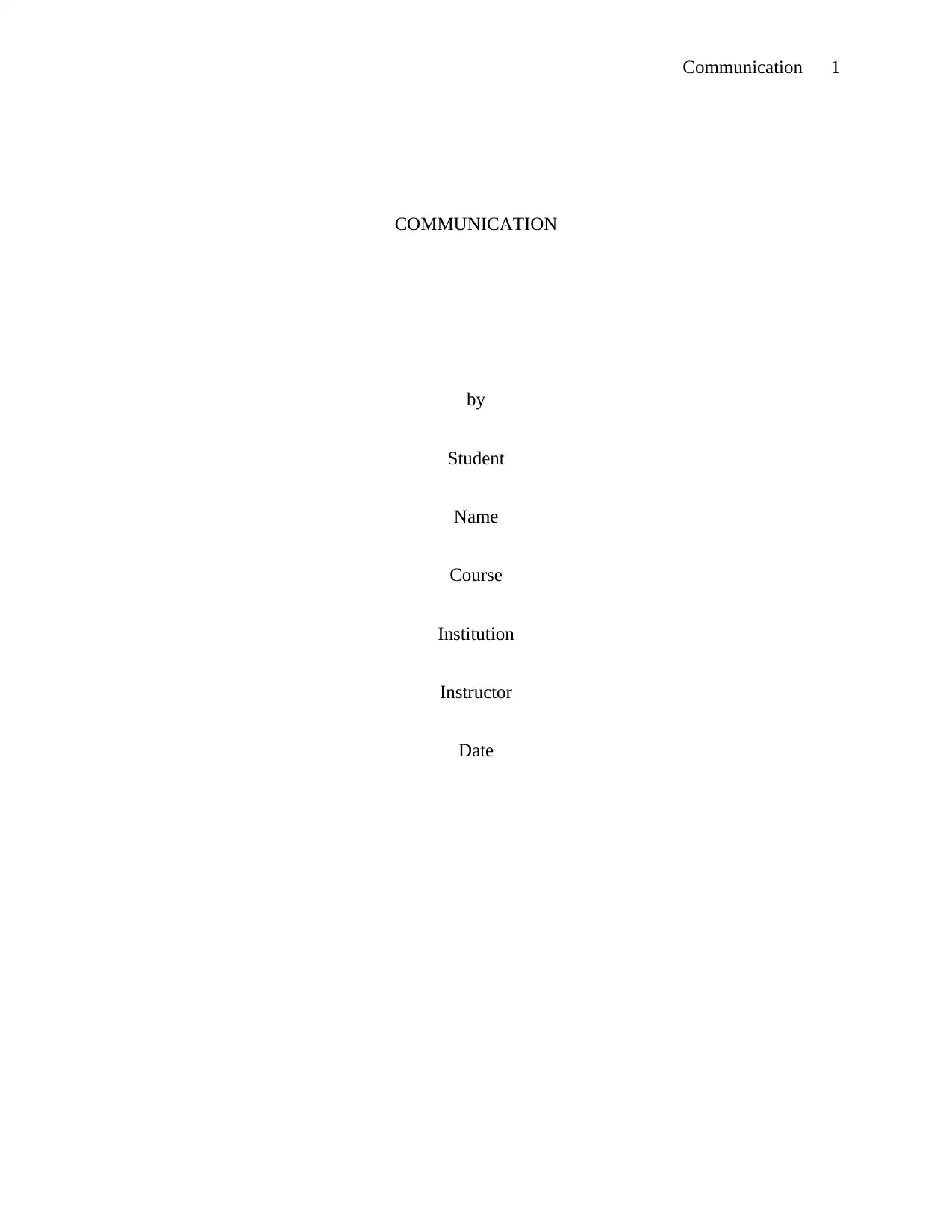
Communication 1
COMMUNICATION
by
Student
Name
Course
Institution
Instructor
Date
COMMUNICATION
by
Student
Name
Course
Institution
Instructor
Date
Paraphrase This Document
Need a fresh take? Get an instant paraphrase of this document with our AI Paraphraser
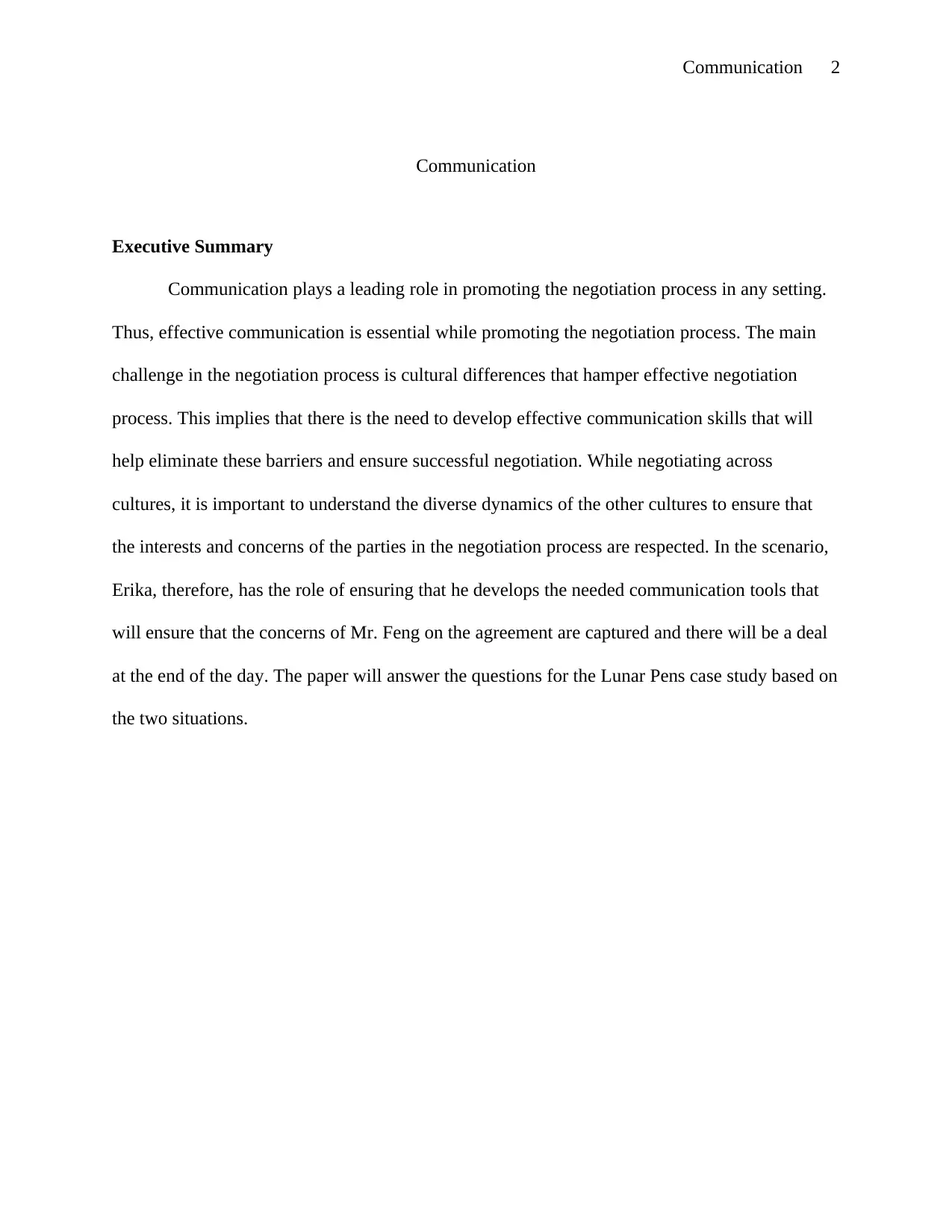
Communication 2
Communication
Executive Summary
Communication plays a leading role in promoting the negotiation process in any setting.
Thus, effective communication is essential while promoting the negotiation process. The main
challenge in the negotiation process is cultural differences that hamper effective negotiation
process. This implies that there is the need to develop effective communication skills that will
help eliminate these barriers and ensure successful negotiation. While negotiating across
cultures, it is important to understand the diverse dynamics of the other cultures to ensure that
the interests and concerns of the parties in the negotiation process are respected. In the scenario,
Erika, therefore, has the role of ensuring that he develops the needed communication tools that
will ensure that the concerns of Mr. Feng on the agreement are captured and there will be a deal
at the end of the day. The paper will answer the questions for the Lunar Pens case study based on
the two situations.
Communication
Executive Summary
Communication plays a leading role in promoting the negotiation process in any setting.
Thus, effective communication is essential while promoting the negotiation process. The main
challenge in the negotiation process is cultural differences that hamper effective negotiation
process. This implies that there is the need to develop effective communication skills that will
help eliminate these barriers and ensure successful negotiation. While negotiating across
cultures, it is important to understand the diverse dynamics of the other cultures to ensure that
the interests and concerns of the parties in the negotiation process are respected. In the scenario,
Erika, therefore, has the role of ensuring that he develops the needed communication tools that
will ensure that the concerns of Mr. Feng on the agreement are captured and there will be a deal
at the end of the day. The paper will answer the questions for the Lunar Pens case study based on
the two situations.
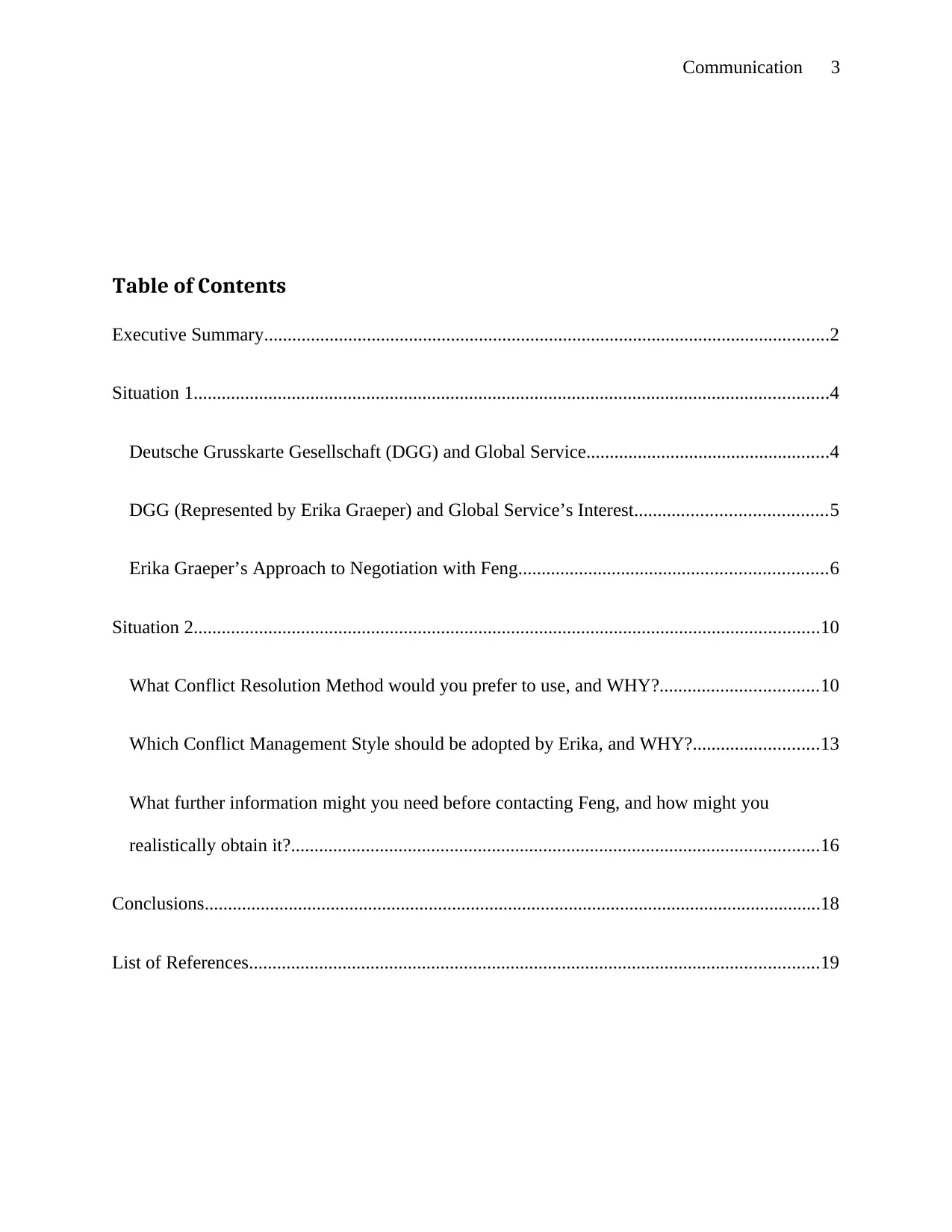
Communication 3
Table of Contents
Executive Summary.........................................................................................................................2
Situation 1........................................................................................................................................4
Deutsche Grusskarte Gesellschaft (DGG) and Global Service....................................................4
DGG (Represented by Erika Graeper) and Global Service’s Interest.........................................5
Erika Graeper’s Approach to Negotiation with Feng..................................................................6
Situation 2......................................................................................................................................10
What Conflict Resolution Method would you prefer to use, and WHY?..................................10
Which Conflict Management Style should be adopted by Erika, and WHY?...........................13
What further information might you need before contacting Feng, and how might you
realistically obtain it?.................................................................................................................16
Conclusions....................................................................................................................................18
List of References..........................................................................................................................19
Table of Contents
Executive Summary.........................................................................................................................2
Situation 1........................................................................................................................................4
Deutsche Grusskarte Gesellschaft (DGG) and Global Service....................................................4
DGG (Represented by Erika Graeper) and Global Service’s Interest.........................................5
Erika Graeper’s Approach to Negotiation with Feng..................................................................6
Situation 2......................................................................................................................................10
What Conflict Resolution Method would you prefer to use, and WHY?..................................10
Which Conflict Management Style should be adopted by Erika, and WHY?...........................13
What further information might you need before contacting Feng, and how might you
realistically obtain it?.................................................................................................................16
Conclusions....................................................................................................................................18
List of References..........................................................................................................................19
⊘ This is a preview!⊘
Do you want full access?
Subscribe today to unlock all pages.

Trusted by 1+ million students worldwide
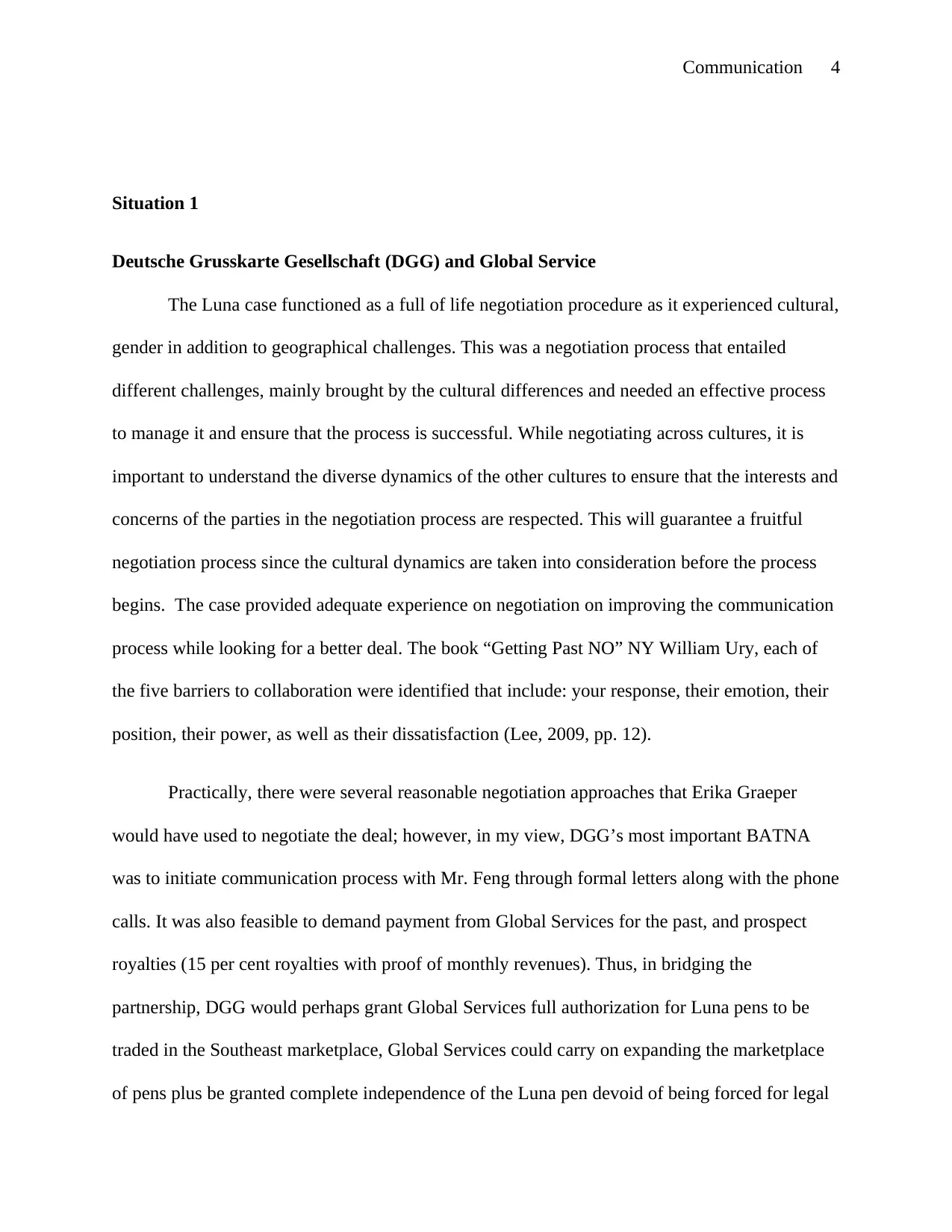
Communication 4
Situation 1
Deutsche Grusskarte Gesellschaft (DGG) and Global Service
The Luna case functioned as a full of life negotiation procedure as it experienced cultural,
gender in addition to geographical challenges. This was a negotiation process that entailed
different challenges, mainly brought by the cultural differences and needed an effective process
to manage it and ensure that the process is successful. While negotiating across cultures, it is
important to understand the diverse dynamics of the other cultures to ensure that the interests and
concerns of the parties in the negotiation process are respected. This will guarantee a fruitful
negotiation process since the cultural dynamics are taken into consideration before the process
begins. The case provided adequate experience on negotiation on improving the communication
process while looking for a better deal. The book “Getting Past NO” NY William Ury, each of
the five barriers to collaboration were identified that include: your response, their emotion, their
position, their power, as well as their dissatisfaction (Lee, 2009, pp. 12).
Practically, there were several reasonable negotiation approaches that Erika Graeper
would have used to negotiate the deal; however, in my view, DGG’s most important BATNA
was to initiate communication process with Mr. Feng through formal letters along with the phone
calls. It was also feasible to demand payment from Global Services for the past, and prospect
royalties (15 per cent royalties with proof of monthly revenues). Thus, in bridging the
partnership, DGG would perhaps grant Global Services full authorization for Luna pens to be
traded in the Southeast marketplace, Global Services could carry on expanding the marketplace
of pens plus be granted complete independence of the Luna pen devoid of being forced for legal
Situation 1
Deutsche Grusskarte Gesellschaft (DGG) and Global Service
The Luna case functioned as a full of life negotiation procedure as it experienced cultural,
gender in addition to geographical challenges. This was a negotiation process that entailed
different challenges, mainly brought by the cultural differences and needed an effective process
to manage it and ensure that the process is successful. While negotiating across cultures, it is
important to understand the diverse dynamics of the other cultures to ensure that the interests and
concerns of the parties in the negotiation process are respected. This will guarantee a fruitful
negotiation process since the cultural dynamics are taken into consideration before the process
begins. The case provided adequate experience on negotiation on improving the communication
process while looking for a better deal. The book “Getting Past NO” NY William Ury, each of
the five barriers to collaboration were identified that include: your response, their emotion, their
position, their power, as well as their dissatisfaction (Lee, 2009, pp. 12).
Practically, there were several reasonable negotiation approaches that Erika Graeper
would have used to negotiate the deal; however, in my view, DGG’s most important BATNA
was to initiate communication process with Mr. Feng through formal letters along with the phone
calls. It was also feasible to demand payment from Global Services for the past, and prospect
royalties (15 per cent royalties with proof of monthly revenues). Thus, in bridging the
partnership, DGG would perhaps grant Global Services full authorization for Luna pens to be
traded in the Southeast marketplace, Global Services could carry on expanding the marketplace
of pens plus be granted complete independence of the Luna pen devoid of being forced for legal
Paraphrase This Document
Need a fresh take? Get an instant paraphrase of this document with our AI Paraphraser
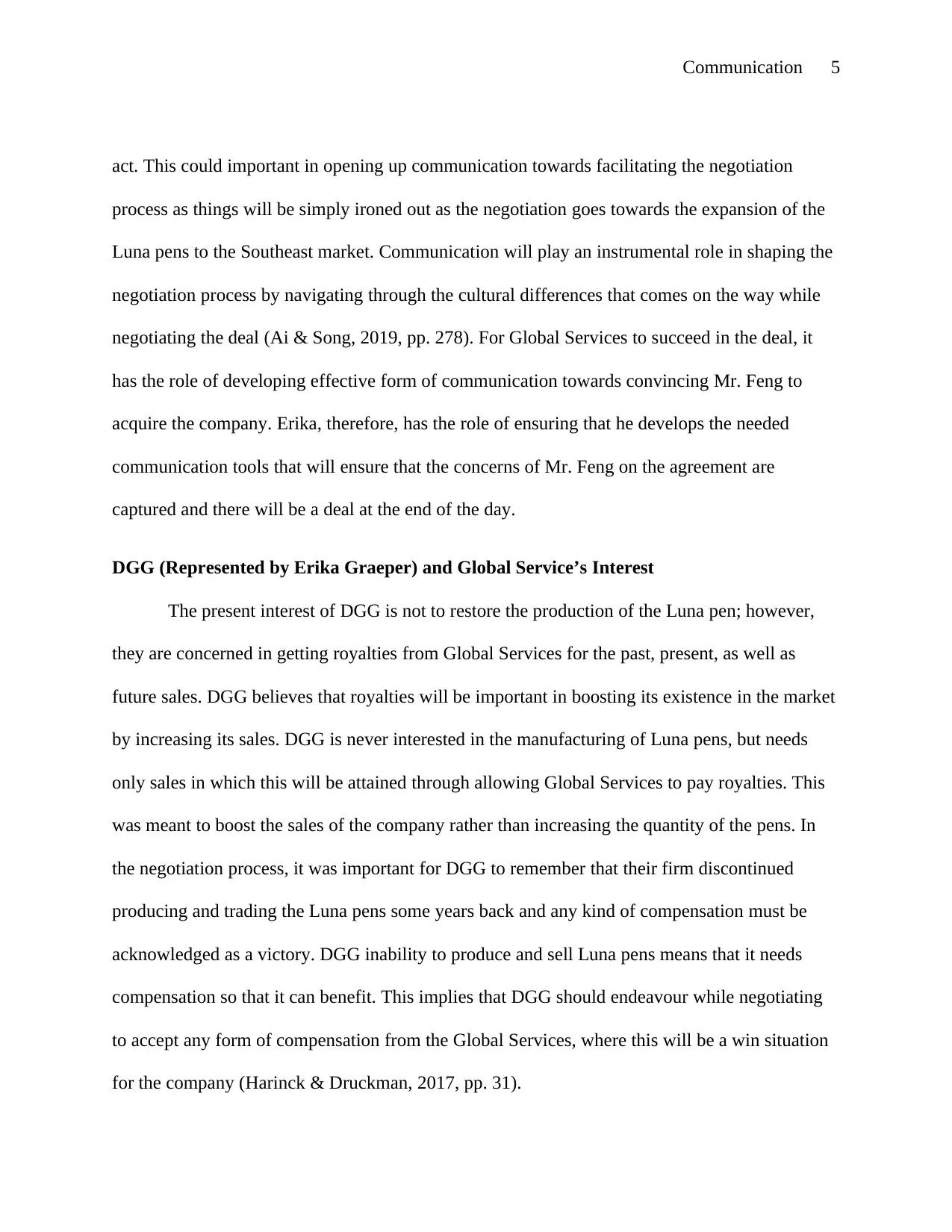
Communication 5
act. This could important in opening up communication towards facilitating the negotiation
process as things will be simply ironed out as the negotiation goes towards the expansion of the
Luna pens to the Southeast market. Communication will play an instrumental role in shaping the
negotiation process by navigating through the cultural differences that comes on the way while
negotiating the deal (Ai & Song, 2019, pp. 278). For Global Services to succeed in the deal, it
has the role of developing effective form of communication towards convincing Mr. Feng to
acquire the company. Erika, therefore, has the role of ensuring that he develops the needed
communication tools that will ensure that the concerns of Mr. Feng on the agreement are
captured and there will be a deal at the end of the day.
DGG (Represented by Erika Graeper) and Global Service’s Interest
The present interest of DGG is not to restore the production of the Luna pen; however,
they are concerned in getting royalties from Global Services for the past, present, as well as
future sales. DGG believes that royalties will be important in boosting its existence in the market
by increasing its sales. DGG is never interested in the manufacturing of Luna pens, but needs
only sales in which this will be attained through allowing Global Services to pay royalties. This
was meant to boost the sales of the company rather than increasing the quantity of the pens. In
the negotiation process, it was important for DGG to remember that their firm discontinued
producing and trading the Luna pens some years back and any kind of compensation must be
acknowledged as a victory. DGG inability to produce and sell Luna pens means that it needs
compensation so that it can benefit. This implies that DGG should endeavour while negotiating
to accept any form of compensation from the Global Services, where this will be a win situation
for the company (Harinck & Druckman, 2017, pp. 31).
act. This could important in opening up communication towards facilitating the negotiation
process as things will be simply ironed out as the negotiation goes towards the expansion of the
Luna pens to the Southeast market. Communication will play an instrumental role in shaping the
negotiation process by navigating through the cultural differences that comes on the way while
negotiating the deal (Ai & Song, 2019, pp. 278). For Global Services to succeed in the deal, it
has the role of developing effective form of communication towards convincing Mr. Feng to
acquire the company. Erika, therefore, has the role of ensuring that he develops the needed
communication tools that will ensure that the concerns of Mr. Feng on the agreement are
captured and there will be a deal at the end of the day.
DGG (Represented by Erika Graeper) and Global Service’s Interest
The present interest of DGG is not to restore the production of the Luna pen; however,
they are concerned in getting royalties from Global Services for the past, present, as well as
future sales. DGG believes that royalties will be important in boosting its existence in the market
by increasing its sales. DGG is never interested in the manufacturing of Luna pens, but needs
only sales in which this will be attained through allowing Global Services to pay royalties. This
was meant to boost the sales of the company rather than increasing the quantity of the pens. In
the negotiation process, it was important for DGG to remember that their firm discontinued
producing and trading the Luna pens some years back and any kind of compensation must be
acknowledged as a victory. DGG inability to produce and sell Luna pens means that it needs
compensation so that it can benefit. This implies that DGG should endeavour while negotiating
to accept any form of compensation from the Global Services, where this will be a win situation
for the company (Harinck & Druckman, 2017, pp. 31).
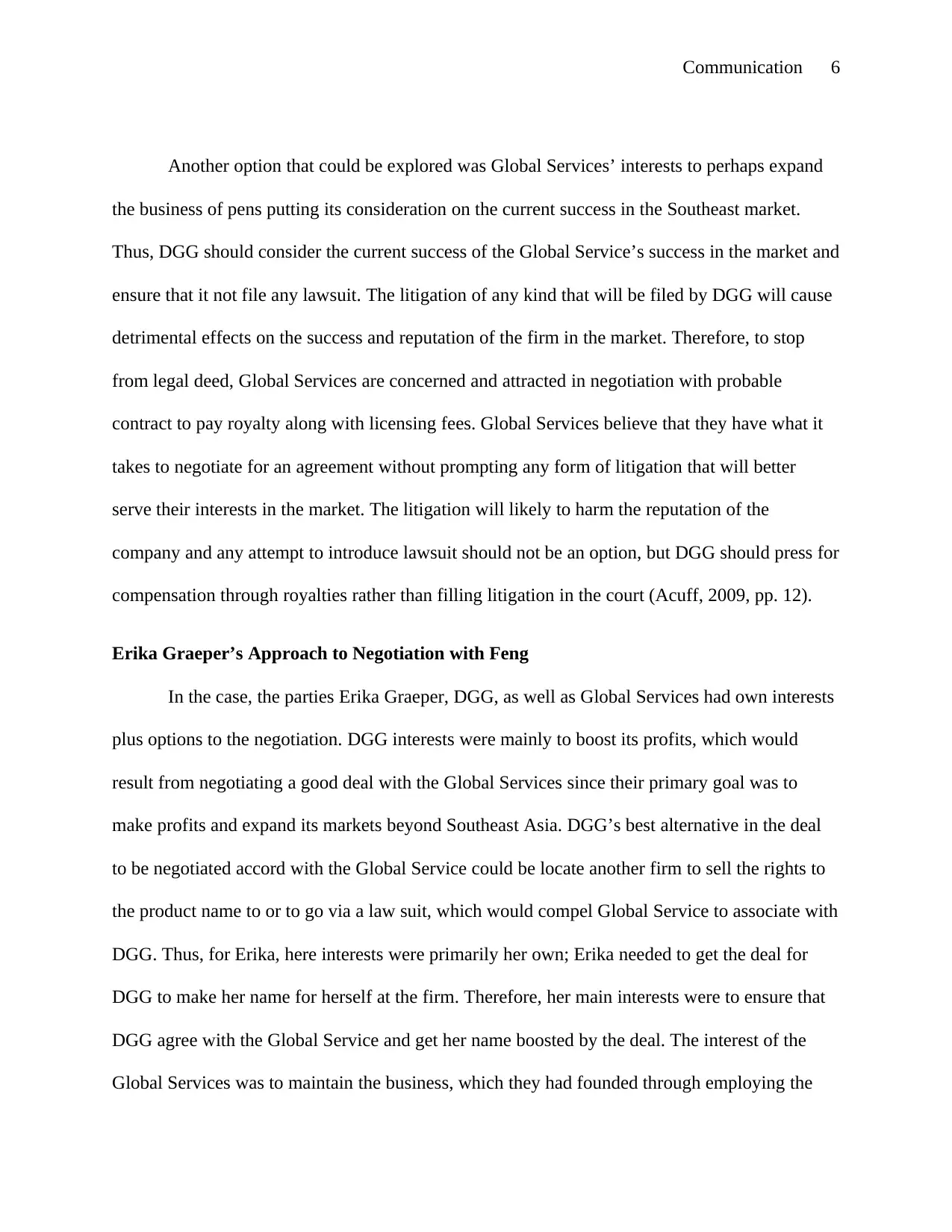
Communication 6
Another option that could be explored was Global Services’ interests to perhaps expand
the business of pens putting its consideration on the current success in the Southeast market.
Thus, DGG should consider the current success of the Global Service’s success in the market and
ensure that it not file any lawsuit. The litigation of any kind that will be filed by DGG will cause
detrimental effects on the success and reputation of the firm in the market. Therefore, to stop
from legal deed, Global Services are concerned and attracted in negotiation with probable
contract to pay royalty along with licensing fees. Global Services believe that they have what it
takes to negotiate for an agreement without prompting any form of litigation that will better
serve their interests in the market. The litigation will likely to harm the reputation of the
company and any attempt to introduce lawsuit should not be an option, but DGG should press for
compensation through royalties rather than filling litigation in the court (Acuff, 2009, pp. 12).
Erika Graeper’s Approach to Negotiation with Feng
In the case, the parties Erika Graeper, DGG, as well as Global Services had own interests
plus options to the negotiation. DGG interests were mainly to boost its profits, which would
result from negotiating a good deal with the Global Services since their primary goal was to
make profits and expand its markets beyond Southeast Asia. DGG’s best alternative in the deal
to be negotiated accord with the Global Service could be locate another firm to sell the rights to
the product name to or to go via a law suit, which would compel Global Service to associate with
DGG. Thus, for Erika, here interests were primarily her own; Erika needed to get the deal for
DGG to make her name for herself at the firm. Therefore, her main interests were to ensure that
DGG agree with the Global Service and get her name boosted by the deal. The interest of the
Global Services was to maintain the business, which they had founded through employing the
Another option that could be explored was Global Services’ interests to perhaps expand
the business of pens putting its consideration on the current success in the Southeast market.
Thus, DGG should consider the current success of the Global Service’s success in the market and
ensure that it not file any lawsuit. The litigation of any kind that will be filed by DGG will cause
detrimental effects on the success and reputation of the firm in the market. Therefore, to stop
from legal deed, Global Services are concerned and attracted in negotiation with probable
contract to pay royalty along with licensing fees. Global Services believe that they have what it
takes to negotiate for an agreement without prompting any form of litigation that will better
serve their interests in the market. The litigation will likely to harm the reputation of the
company and any attempt to introduce lawsuit should not be an option, but DGG should press for
compensation through royalties rather than filling litigation in the court (Acuff, 2009, pp. 12).
Erika Graeper’s Approach to Negotiation with Feng
In the case, the parties Erika Graeper, DGG, as well as Global Services had own interests
plus options to the negotiation. DGG interests were mainly to boost its profits, which would
result from negotiating a good deal with the Global Services since their primary goal was to
make profits and expand its markets beyond Southeast Asia. DGG’s best alternative in the deal
to be negotiated accord with the Global Service could be locate another firm to sell the rights to
the product name to or to go via a law suit, which would compel Global Service to associate with
DGG. Thus, for Erika, here interests were primarily her own; Erika needed to get the deal for
DGG to make her name for herself at the firm. Therefore, her main interests were to ensure that
DGG agree with the Global Service and get her name boosted by the deal. The interest of the
Global Services was to maintain the business, which they had founded through employing the
⊘ This is a preview!⊘
Do you want full access?
Subscribe today to unlock all pages.

Trusted by 1+ million students worldwide
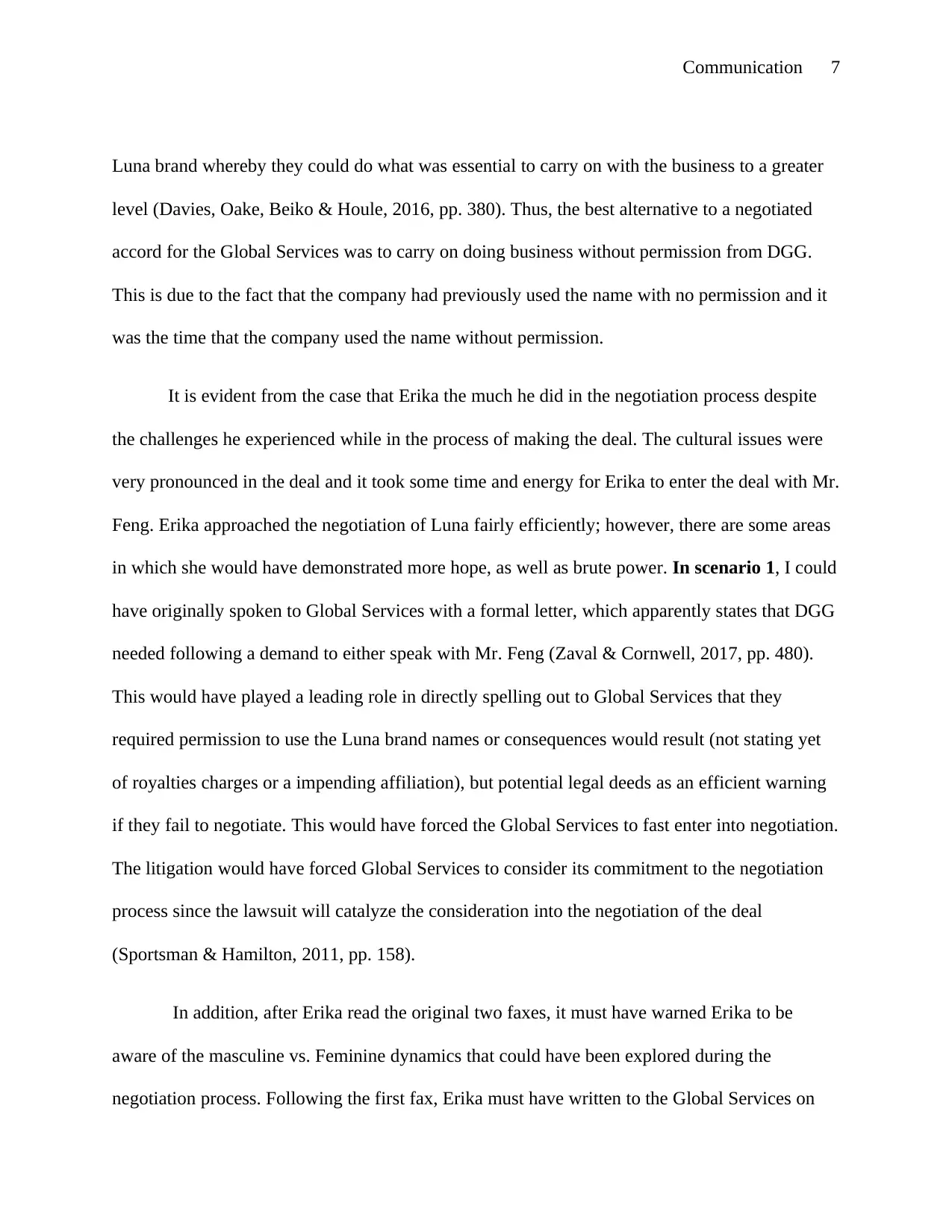
Communication 7
Luna brand whereby they could do what was essential to carry on with the business to a greater
level (Davies, Oake, Beiko & Houle, 2016, pp. 380). Thus, the best alternative to a negotiated
accord for the Global Services was to carry on doing business without permission from DGG.
This is due to the fact that the company had previously used the name with no permission and it
was the time that the company used the name without permission.
It is evident from the case that Erika the much he did in the negotiation process despite
the challenges he experienced while in the process of making the deal. The cultural issues were
very pronounced in the deal and it took some time and energy for Erika to enter the deal with Mr.
Feng. Erika approached the negotiation of Luna fairly efficiently; however, there are some areas
in which she would have demonstrated more hope, as well as brute power. In scenario 1, I could
have originally spoken to Global Services with a formal letter, which apparently states that DGG
needed following a demand to either speak with Mr. Feng (Zaval & Cornwell, 2017, pp. 480).
This would have played a leading role in directly spelling out to Global Services that they
required permission to use the Luna brand names or consequences would result (not stating yet
of royalties charges or a impending affiliation), but potential legal deeds as an efficient warning
if they fail to negotiate. This would have forced the Global Services to fast enter into negotiation.
The litigation would have forced Global Services to consider its commitment to the negotiation
process since the lawsuit will catalyze the consideration into the negotiation of the deal
(Sportsman & Hamilton, 2011, pp. 158).
In addition, after Erika read the original two faxes, it must have warned Erika to be
aware of the masculine vs. Feminine dynamics that could have been explored during the
negotiation process. Following the first fax, Erika must have written to the Global Services on
Luna brand whereby they could do what was essential to carry on with the business to a greater
level (Davies, Oake, Beiko & Houle, 2016, pp. 380). Thus, the best alternative to a negotiated
accord for the Global Services was to carry on doing business without permission from DGG.
This is due to the fact that the company had previously used the name with no permission and it
was the time that the company used the name without permission.
It is evident from the case that Erika the much he did in the negotiation process despite
the challenges he experienced while in the process of making the deal. The cultural issues were
very pronounced in the deal and it took some time and energy for Erika to enter the deal with Mr.
Feng. Erika approached the negotiation of Luna fairly efficiently; however, there are some areas
in which she would have demonstrated more hope, as well as brute power. In scenario 1, I could
have originally spoken to Global Services with a formal letter, which apparently states that DGG
needed following a demand to either speak with Mr. Feng (Zaval & Cornwell, 2017, pp. 480).
This would have played a leading role in directly spelling out to Global Services that they
required permission to use the Luna brand names or consequences would result (not stating yet
of royalties charges or a impending affiliation), but potential legal deeds as an efficient warning
if they fail to negotiate. This would have forced the Global Services to fast enter into negotiation.
The litigation would have forced Global Services to consider its commitment to the negotiation
process since the lawsuit will catalyze the consideration into the negotiation of the deal
(Sportsman & Hamilton, 2011, pp. 158).
In addition, after Erika read the original two faxes, it must have warned Erika to be
aware of the masculine vs. Feminine dynamics that could have been explored during the
negotiation process. Following the first fax, Erika must have written to the Global Services on
Paraphrase This Document
Need a fresh take? Get an instant paraphrase of this document with our AI Paraphraser
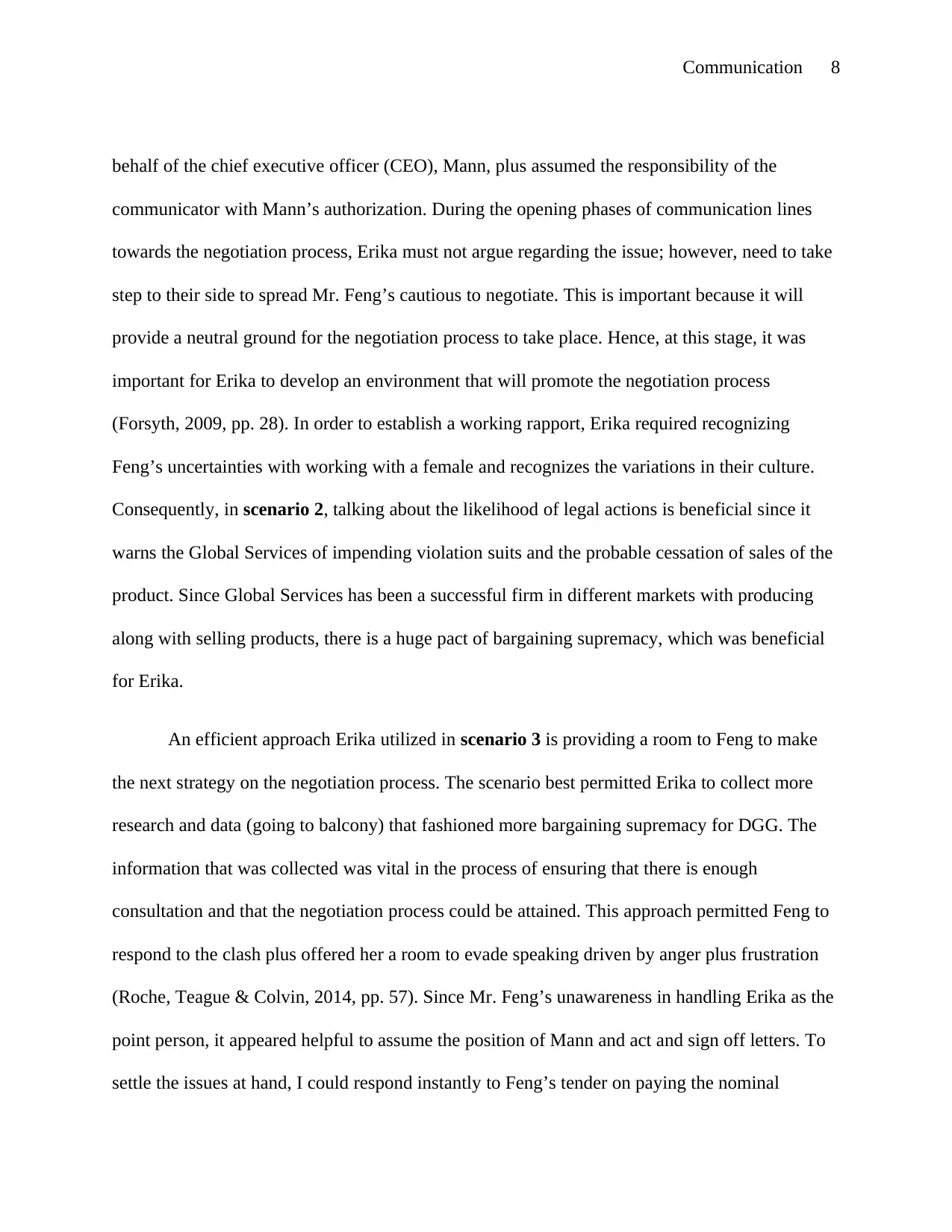
Communication 8
behalf of the chief executive officer (CEO), Mann, plus assumed the responsibility of the
communicator with Mann’s authorization. During the opening phases of communication lines
towards the negotiation process, Erika must not argue regarding the issue; however, need to take
step to their side to spread Mr. Feng’s cautious to negotiate. This is important because it will
provide a neutral ground for the negotiation process to take place. Hence, at this stage, it was
important for Erika to develop an environment that will promote the negotiation process
(Forsyth, 2009, pp. 28). In order to establish a working rapport, Erika required recognizing
Feng’s uncertainties with working with a female and recognizes the variations in their culture.
Consequently, in scenario 2, talking about the likelihood of legal actions is beneficial since it
warns the Global Services of impending violation suits and the probable cessation of sales of the
product. Since Global Services has been a successful firm in different markets with producing
along with selling products, there is a huge pact of bargaining supremacy, which was beneficial
for Erika.
An efficient approach Erika utilized in scenario 3 is providing a room to Feng to make
the next strategy on the negotiation process. The scenario best permitted Erika to collect more
research and data (going to balcony) that fashioned more bargaining supremacy for DGG. The
information that was collected was vital in the process of ensuring that there is enough
consultation and that the negotiation process could be attained. This approach permitted Feng to
respond to the clash plus offered her a room to evade speaking driven by anger plus frustration
(Roche, Teague & Colvin, 2014, pp. 57). Since Mr. Feng’s unawareness in handling Erika as the
point person, it appeared helpful to assume the position of Mann and act and sign off letters. To
settle the issues at hand, I could respond instantly to Feng’s tender on paying the nominal
behalf of the chief executive officer (CEO), Mann, plus assumed the responsibility of the
communicator with Mann’s authorization. During the opening phases of communication lines
towards the negotiation process, Erika must not argue regarding the issue; however, need to take
step to their side to spread Mr. Feng’s cautious to negotiate. This is important because it will
provide a neutral ground for the negotiation process to take place. Hence, at this stage, it was
important for Erika to develop an environment that will promote the negotiation process
(Forsyth, 2009, pp. 28). In order to establish a working rapport, Erika required recognizing
Feng’s uncertainties with working with a female and recognizes the variations in their culture.
Consequently, in scenario 2, talking about the likelihood of legal actions is beneficial since it
warns the Global Services of impending violation suits and the probable cessation of sales of the
product. Since Global Services has been a successful firm in different markets with producing
along with selling products, there is a huge pact of bargaining supremacy, which was beneficial
for Erika.
An efficient approach Erika utilized in scenario 3 is providing a room to Feng to make
the next strategy on the negotiation process. The scenario best permitted Erika to collect more
research and data (going to balcony) that fashioned more bargaining supremacy for DGG. The
information that was collected was vital in the process of ensuring that there is enough
consultation and that the negotiation process could be attained. This approach permitted Feng to
respond to the clash plus offered her a room to evade speaking driven by anger plus frustration
(Roche, Teague & Colvin, 2014, pp. 57). Since Mr. Feng’s unawareness in handling Erika as the
point person, it appeared helpful to assume the position of Mann and act and sign off letters. To
settle the issues at hand, I could respond instantly to Feng’s tender on paying the nominal
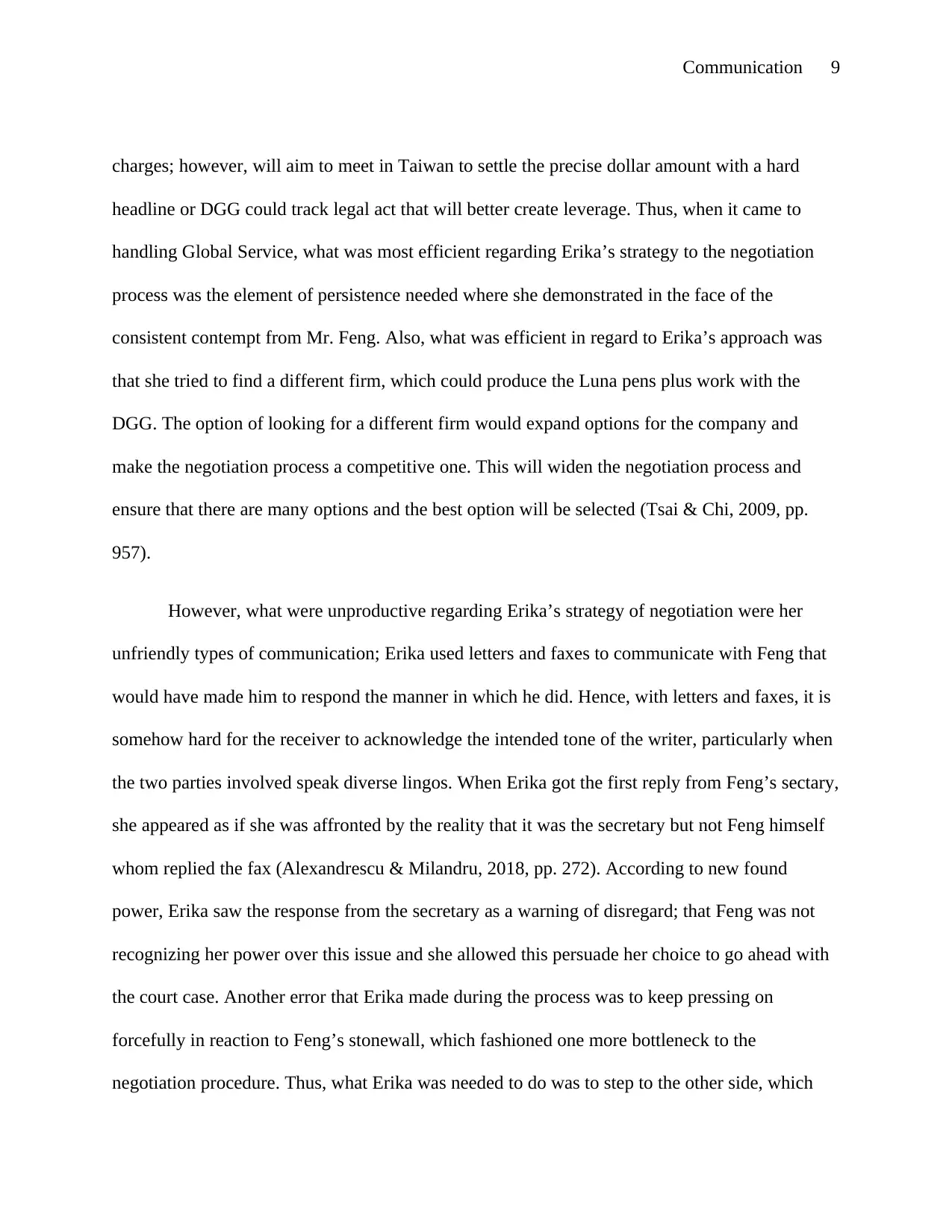
Communication 9
charges; however, will aim to meet in Taiwan to settle the precise dollar amount with a hard
headline or DGG could track legal act that will better create leverage. Thus, when it came to
handling Global Service, what was most efficient regarding Erika’s strategy to the negotiation
process was the element of persistence needed where she demonstrated in the face of the
consistent contempt from Mr. Feng. Also, what was efficient in regard to Erika’s approach was
that she tried to find a different firm, which could produce the Luna pens plus work with the
DGG. The option of looking for a different firm would expand options for the company and
make the negotiation process a competitive one. This will widen the negotiation process and
ensure that there are many options and the best option will be selected (Tsai & Chi, 2009, pp.
957).
However, what were unproductive regarding Erika’s strategy of negotiation were her
unfriendly types of communication; Erika used letters and faxes to communicate with Feng that
would have made him to respond the manner in which he did. Hence, with letters and faxes, it is
somehow hard for the receiver to acknowledge the intended tone of the writer, particularly when
the two parties involved speak diverse lingos. When Erika got the first reply from Feng’s sectary,
she appeared as if she was affronted by the reality that it was the secretary but not Feng himself
whom replied the fax (Alexandrescu & Milandru, 2018, pp. 272). According to new found
power, Erika saw the response from the secretary as a warning of disregard; that Feng was not
recognizing her power over this issue and she allowed this persuade her choice to go ahead with
the court case. Another error that Erika made during the process was to keep pressing on
forcefully in reaction to Feng’s stonewall, which fashioned one more bottleneck to the
negotiation procedure. Thus, what Erika was needed to do was to step to the other side, which
charges; however, will aim to meet in Taiwan to settle the precise dollar amount with a hard
headline or DGG could track legal act that will better create leverage. Thus, when it came to
handling Global Service, what was most efficient regarding Erika’s strategy to the negotiation
process was the element of persistence needed where she demonstrated in the face of the
consistent contempt from Mr. Feng. Also, what was efficient in regard to Erika’s approach was
that she tried to find a different firm, which could produce the Luna pens plus work with the
DGG. The option of looking for a different firm would expand options for the company and
make the negotiation process a competitive one. This will widen the negotiation process and
ensure that there are many options and the best option will be selected (Tsai & Chi, 2009, pp.
957).
However, what were unproductive regarding Erika’s strategy of negotiation were her
unfriendly types of communication; Erika used letters and faxes to communicate with Feng that
would have made him to respond the manner in which he did. Hence, with letters and faxes, it is
somehow hard for the receiver to acknowledge the intended tone of the writer, particularly when
the two parties involved speak diverse lingos. When Erika got the first reply from Feng’s sectary,
she appeared as if she was affronted by the reality that it was the secretary but not Feng himself
whom replied the fax (Alexandrescu & Milandru, 2018, pp. 272). According to new found
power, Erika saw the response from the secretary as a warning of disregard; that Feng was not
recognizing her power over this issue and she allowed this persuade her choice to go ahead with
the court case. Another error that Erika made during the process was to keep pressing on
forcefully in reaction to Feng’s stonewall, which fashioned one more bottleneck to the
negotiation procedure. Thus, what Erika was needed to do was to step to the other side, which
⊘ This is a preview!⊘
Do you want full access?
Subscribe today to unlock all pages.

Trusted by 1+ million students worldwide
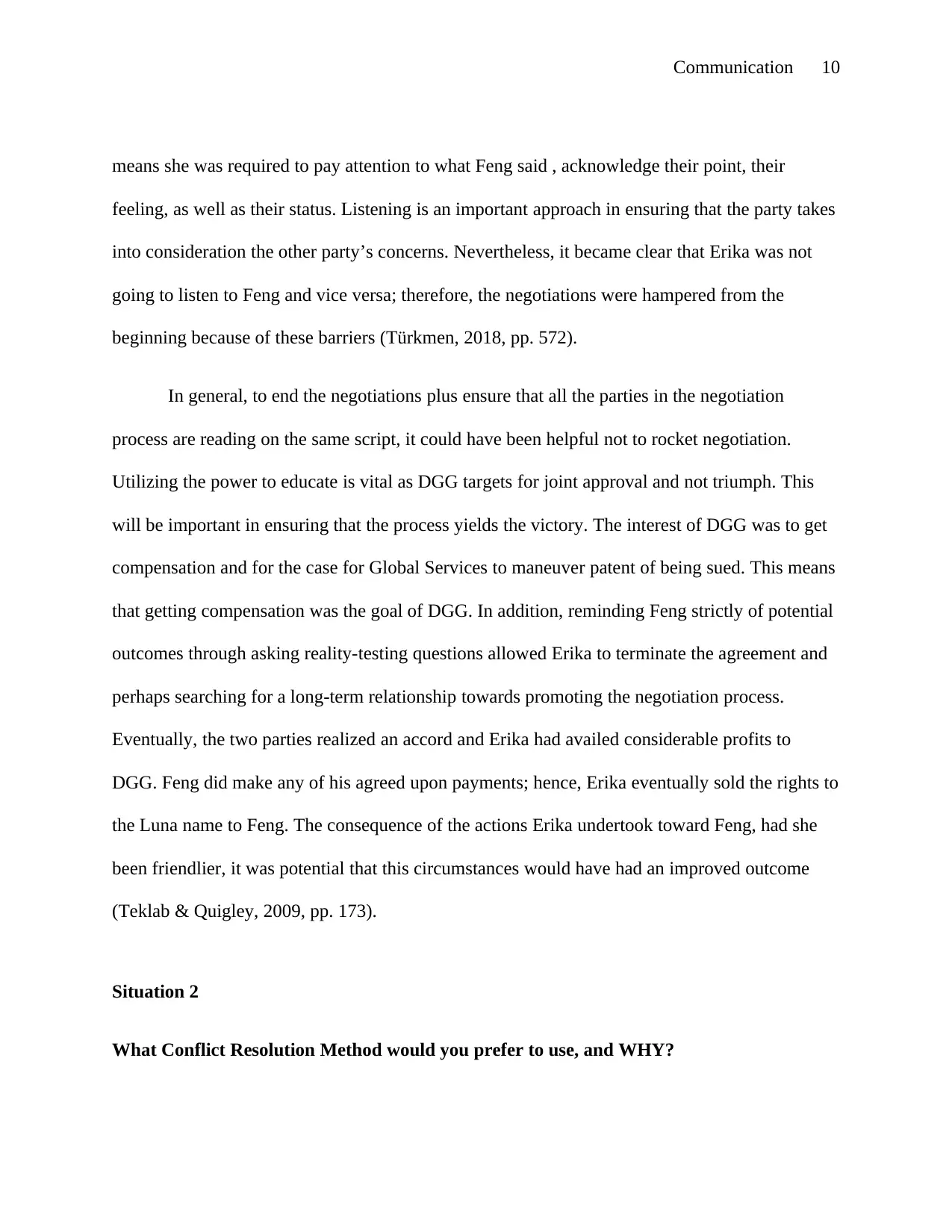
Communication 10
means she was required to pay attention to what Feng said , acknowledge their point, their
feeling, as well as their status. Listening is an important approach in ensuring that the party takes
into consideration the other party’s concerns. Nevertheless, it became clear that Erika was not
going to listen to Feng and vice versa; therefore, the negotiations were hampered from the
beginning because of these barriers (Türkmen, 2018, pp. 572).
In general, to end the negotiations plus ensure that all the parties in the negotiation
process are reading on the same script, it could have been helpful not to rocket negotiation.
Utilizing the power to educate is vital as DGG targets for joint approval and not triumph. This
will be important in ensuring that the process yields the victory. The interest of DGG was to get
compensation and for the case for Global Services to maneuver patent of being sued. This means
that getting compensation was the goal of DGG. In addition, reminding Feng strictly of potential
outcomes through asking reality-testing questions allowed Erika to terminate the agreement and
perhaps searching for a long-term relationship towards promoting the negotiation process.
Eventually, the two parties realized an accord and Erika had availed considerable profits to
DGG. Feng did make any of his agreed upon payments; hence, Erika eventually sold the rights to
the Luna name to Feng. The consequence of the actions Erika undertook toward Feng, had she
been friendlier, it was potential that this circumstances would have had an improved outcome
(Teklab & Quigley, 2009, pp. 173).
Situation 2
What Conflict Resolution Method would you prefer to use, and WHY?
means she was required to pay attention to what Feng said , acknowledge their point, their
feeling, as well as their status. Listening is an important approach in ensuring that the party takes
into consideration the other party’s concerns. Nevertheless, it became clear that Erika was not
going to listen to Feng and vice versa; therefore, the negotiations were hampered from the
beginning because of these barriers (Türkmen, 2018, pp. 572).
In general, to end the negotiations plus ensure that all the parties in the negotiation
process are reading on the same script, it could have been helpful not to rocket negotiation.
Utilizing the power to educate is vital as DGG targets for joint approval and not triumph. This
will be important in ensuring that the process yields the victory. The interest of DGG was to get
compensation and for the case for Global Services to maneuver patent of being sued. This means
that getting compensation was the goal of DGG. In addition, reminding Feng strictly of potential
outcomes through asking reality-testing questions allowed Erika to terminate the agreement and
perhaps searching for a long-term relationship towards promoting the negotiation process.
Eventually, the two parties realized an accord and Erika had availed considerable profits to
DGG. Feng did make any of his agreed upon payments; hence, Erika eventually sold the rights to
the Luna name to Feng. The consequence of the actions Erika undertook toward Feng, had she
been friendlier, it was potential that this circumstances would have had an improved outcome
(Teklab & Quigley, 2009, pp. 173).
Situation 2
What Conflict Resolution Method would you prefer to use, and WHY?
Paraphrase This Document
Need a fresh take? Get an instant paraphrase of this document with our AI Paraphraser
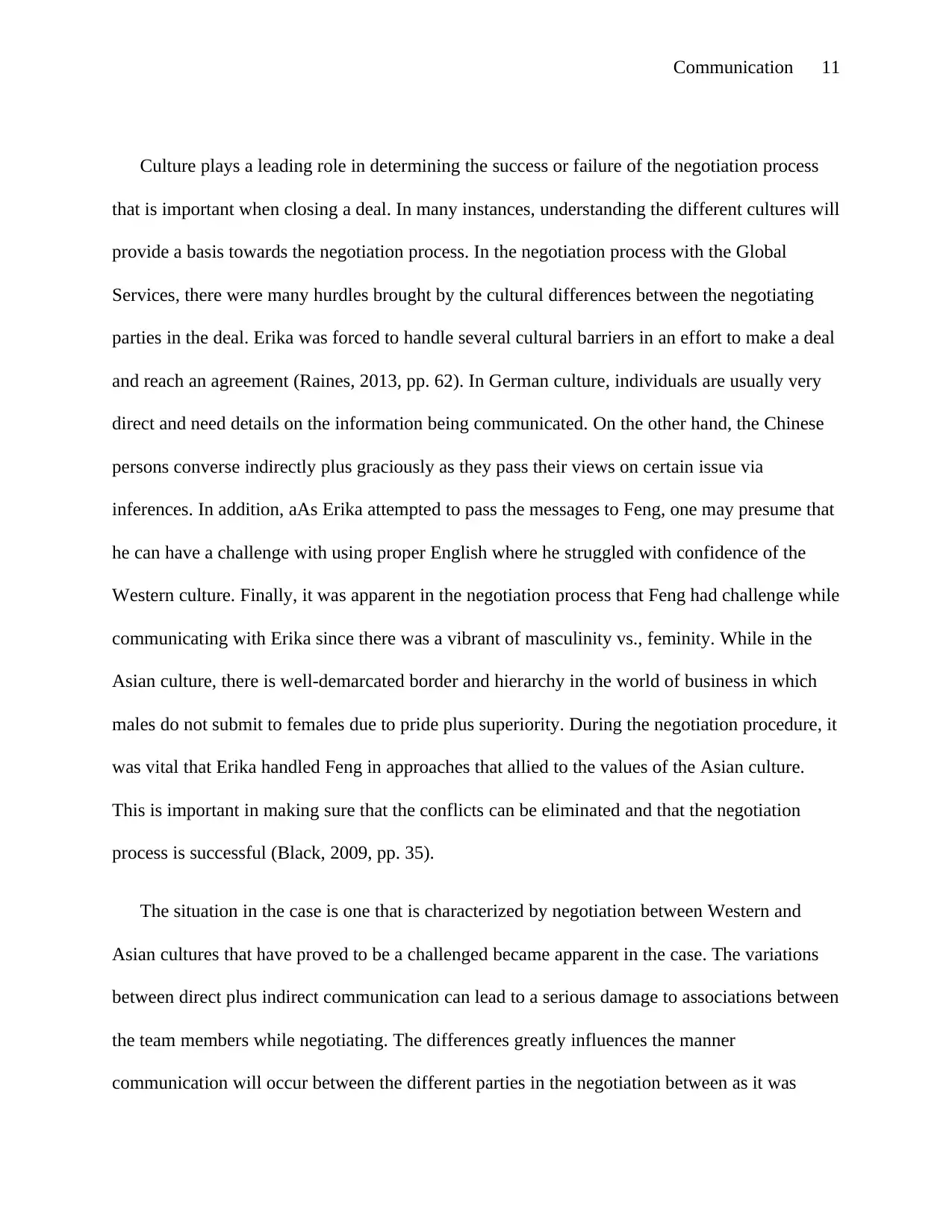
Communication 11
Culture plays a leading role in determining the success or failure of the negotiation process
that is important when closing a deal. In many instances, understanding the different cultures will
provide a basis towards the negotiation process. In the negotiation process with the Global
Services, there were many hurdles brought by the cultural differences between the negotiating
parties in the deal. Erika was forced to handle several cultural barriers in an effort to make a deal
and reach an agreement (Raines, 2013, pp. 62). In German culture, individuals are usually very
direct and need details on the information being communicated. On the other hand, the Chinese
persons converse indirectly plus graciously as they pass their views on certain issue via
inferences. In addition, aAs Erika attempted to pass the messages to Feng, one may presume that
he can have a challenge with using proper English where he struggled with confidence of the
Western culture. Finally, it was apparent in the negotiation process that Feng had challenge while
communicating with Erika since there was a vibrant of masculinity vs., feminity. While in the
Asian culture, there is well-demarcated border and hierarchy in the world of business in which
males do not submit to females due to pride plus superiority. During the negotiation procedure, it
was vital that Erika handled Feng in approaches that allied to the values of the Asian culture.
This is important in making sure that the conflicts can be eliminated and that the negotiation
process is successful (Black, 2009, pp. 35).
The situation in the case is one that is characterized by negotiation between Western and
Asian cultures that have proved to be a challenged became apparent in the case. The variations
between direct plus indirect communication can lead to a serious damage to associations between
the team members while negotiating. The differences greatly influences the manner
communication will occur between the different parties in the negotiation between as it was
Culture plays a leading role in determining the success or failure of the negotiation process
that is important when closing a deal. In many instances, understanding the different cultures will
provide a basis towards the negotiation process. In the negotiation process with the Global
Services, there were many hurdles brought by the cultural differences between the negotiating
parties in the deal. Erika was forced to handle several cultural barriers in an effort to make a deal
and reach an agreement (Raines, 2013, pp. 62). In German culture, individuals are usually very
direct and need details on the information being communicated. On the other hand, the Chinese
persons converse indirectly plus graciously as they pass their views on certain issue via
inferences. In addition, aAs Erika attempted to pass the messages to Feng, one may presume that
he can have a challenge with using proper English where he struggled with confidence of the
Western culture. Finally, it was apparent in the negotiation process that Feng had challenge while
communicating with Erika since there was a vibrant of masculinity vs., feminity. While in the
Asian culture, there is well-demarcated border and hierarchy in the world of business in which
males do not submit to females due to pride plus superiority. During the negotiation procedure, it
was vital that Erika handled Feng in approaches that allied to the values of the Asian culture.
This is important in making sure that the conflicts can be eliminated and that the negotiation
process is successful (Black, 2009, pp. 35).
The situation in the case is one that is characterized by negotiation between Western and
Asian cultures that have proved to be a challenged became apparent in the case. The variations
between direct plus indirect communication can lead to a serious damage to associations between
the team members while negotiating. The differences greatly influences the manner
communication will occur between the different parties in the negotiation between as it was
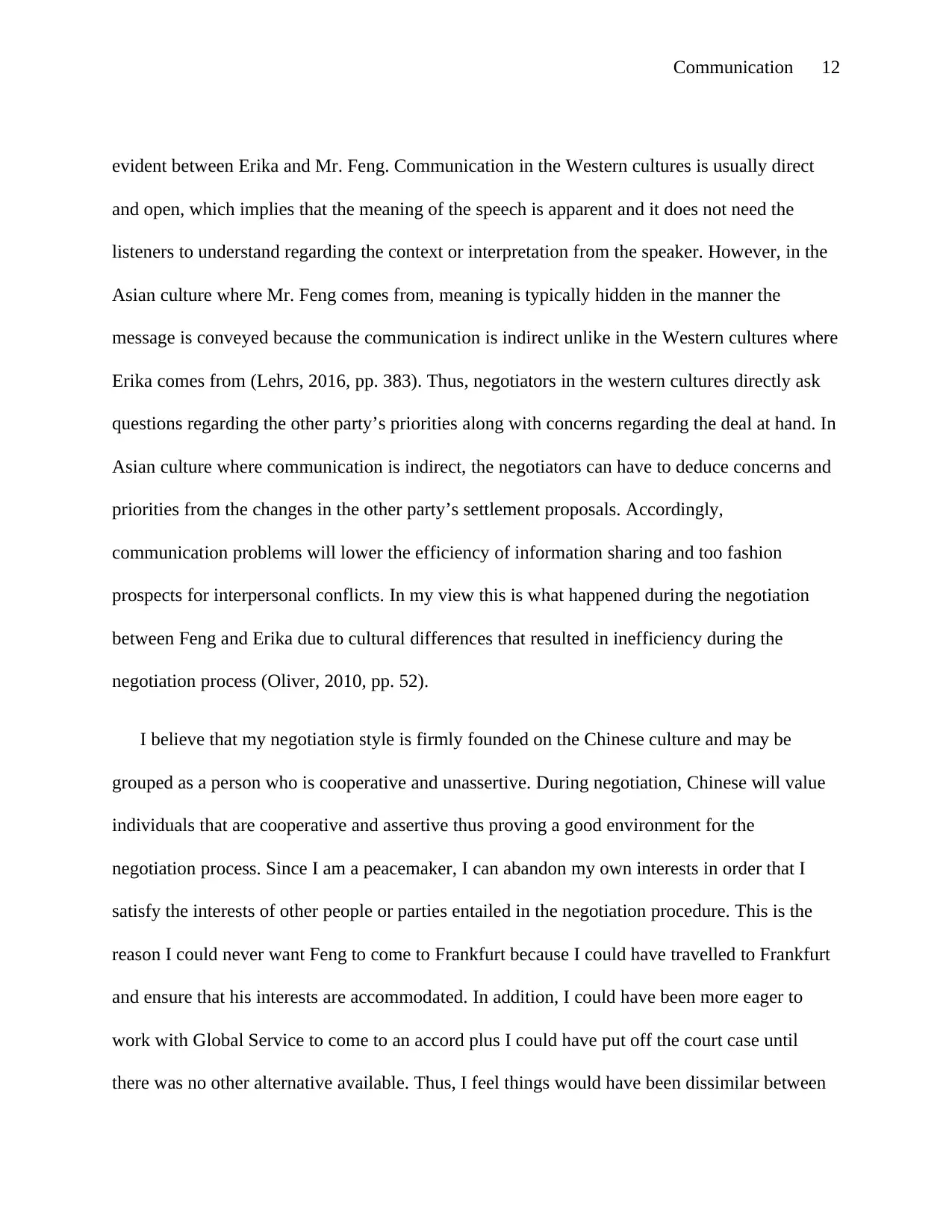
Communication 12
evident between Erika and Mr. Feng. Communication in the Western cultures is usually direct
and open, which implies that the meaning of the speech is apparent and it does not need the
listeners to understand regarding the context or interpretation from the speaker. However, in the
Asian culture where Mr. Feng comes from, meaning is typically hidden in the manner the
message is conveyed because the communication is indirect unlike in the Western cultures where
Erika comes from (Lehrs, 2016, pp. 383). Thus, negotiators in the western cultures directly ask
questions regarding the other party’s priorities along with concerns regarding the deal at hand. In
Asian culture where communication is indirect, the negotiators can have to deduce concerns and
priorities from the changes in the other party’s settlement proposals. Accordingly,
communication problems will lower the efficiency of information sharing and too fashion
prospects for interpersonal conflicts. In my view this is what happened during the negotiation
between Feng and Erika due to cultural differences that resulted in inefficiency during the
negotiation process (Oliver, 2010, pp. 52).
I believe that my negotiation style is firmly founded on the Chinese culture and may be
grouped as a person who is cooperative and unassertive. During negotiation, Chinese will value
individuals that are cooperative and assertive thus proving a good environment for the
negotiation process. Since I am a peacemaker, I can abandon my own interests in order that I
satisfy the interests of other people or parties entailed in the negotiation procedure. This is the
reason I could never want Feng to come to Frankfurt because I could have travelled to Frankfurt
and ensure that his interests are accommodated. In addition, I could have been more eager to
work with Global Service to come to an accord plus I could have put off the court case until
there was no other alternative available. Thus, I feel things would have been dissimilar between
evident between Erika and Mr. Feng. Communication in the Western cultures is usually direct
and open, which implies that the meaning of the speech is apparent and it does not need the
listeners to understand regarding the context or interpretation from the speaker. However, in the
Asian culture where Mr. Feng comes from, meaning is typically hidden in the manner the
message is conveyed because the communication is indirect unlike in the Western cultures where
Erika comes from (Lehrs, 2016, pp. 383). Thus, negotiators in the western cultures directly ask
questions regarding the other party’s priorities along with concerns regarding the deal at hand. In
Asian culture where communication is indirect, the negotiators can have to deduce concerns and
priorities from the changes in the other party’s settlement proposals. Accordingly,
communication problems will lower the efficiency of information sharing and too fashion
prospects for interpersonal conflicts. In my view this is what happened during the negotiation
between Feng and Erika due to cultural differences that resulted in inefficiency during the
negotiation process (Oliver, 2010, pp. 52).
I believe that my negotiation style is firmly founded on the Chinese culture and may be
grouped as a person who is cooperative and unassertive. During negotiation, Chinese will value
individuals that are cooperative and assertive thus proving a good environment for the
negotiation process. Since I am a peacemaker, I can abandon my own interests in order that I
satisfy the interests of other people or parties entailed in the negotiation procedure. This is the
reason I could never want Feng to come to Frankfurt because I could have travelled to Frankfurt
and ensure that his interests are accommodated. In addition, I could have been more eager to
work with Global Service to come to an accord plus I could have put off the court case until
there was no other alternative available. Thus, I feel things would have been dissimilar between
⊘ This is a preview!⊘
Do you want full access?
Subscribe today to unlock all pages.

Trusted by 1+ million students worldwide
1 out of 24
Related Documents
Your All-in-One AI-Powered Toolkit for Academic Success.
+13062052269
info@desklib.com
Available 24*7 on WhatsApp / Email
![[object Object]](/_next/static/media/star-bottom.7253800d.svg)
Unlock your academic potential
Copyright © 2020–2026 A2Z Services. All Rights Reserved. Developed and managed by ZUCOL.



